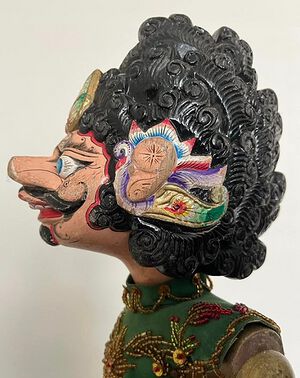Kakrasana
| Title | Kakrasana - (Raden) - Mahabharata |
|---|---|
| Other names | Baladewa, Halayuda, Kusuma Walikita, Wasi Jaladara, Crapang Curiganata. |
| Size | 60 cm |
| Personal data | Raden Kakrasana (his skin was white) was the oldest son of king Basudewa and Dewi Rohini. The other children were named Raden Narayana (his skin was Black) and Dewi Bratajaya (Arjuna’s first wife). Raden Kakrasana, Narayana, and Bratajaya lived with Ki Demang Antiagupa in the village of Widara Kandhang, but did not know that they were children of King Basudewa from the Kingdom of Mandura until the story of Kangsa Adu jago (Kangsa hosts a fight see the story of Kangsa Dewa). Actually Kakrasana is not Nayarana's twin brother, they actually have different mothers, Kakrasana is the son of Dewi Rohini and Nayarana is the son of Dewi Dewani. This goddess died after giving birth. In Javanese this is called Mati Konduran. So the baby Nayarana was breastfed by Kakrasana’s mother. That is why the two babies were thought to be twins. Raden Kakrasana was married to Dewi Erawati, the eldest daughter of king Salyapati from the Kingdom of Mandaraka. From their marriage they had one son named Raden Wisatha. |
| Appearance | Raden Kakrasana had kedondong eyes, a complete nose and face (sembada). Wearing a crest with a garuda on the back. Loose hair in a plain (ordinary) shape. Wearing a crescent moon necklace, indicating that he was still a knight young. Bangled, stubbled and croaked. Wearing a royal (Katongan) cloth. His character is tough and angry, but his anger easily subsides. |
| Collection | Private collection |
Kakrasana – (Raden) – Mahabharata
Kakrasana is the incarnation of Hyang Basuki, the Snake God. In his youth he became a priest, named Wasi Jaladara. The reason he became a priest was because his country was ruled by a giant knight, named Raden Kangsa. Kangsa is constantly looking for Kakrasana, with the intention of killing him, because by Kangsa, Kakrasana is considered to be the person who will rule the country of Madura.
During his time as a priest, Kakrasana was very alert and calm, until he became famous as a powerful priest. Because of his vigilance, Jaladara was able to find out about supernatural things, so he was able to find a daughter of the Madraka king, named Dewi Herawati, who was stolen by Raden Kartawiyaga, the son of the giant king, named Karondageni from the Tirtakandasan country. Finally, the princess became the wife of Wasi Jaladara, who later reigned in the country of Madura.
When Kakrasana reigned as king in Madura, he was named Prabu Baladewa. Raden Kakrasana had two magical weapons: a spear called Nanggala (came from gigantic poisonous snake) and Alugara. These weapons were inside his arms, and would only come out when he needed them to fight.
In the story of Indrajala Maling, princess Erawati was due to marry King Jaka Pitana from the Kingdom of Astinapura, but she was kidnapped and went missing for many months. King Salyapati opened a Sayembara (competition) rewarding the person who found his daughter with his daughters hand in marriage. King Jaka Pitana asked his brothers, the Korawa to enter the competition and find her. At the same time, Raden Kakrasana was meditating under the water fall (grojogan sewu), and people called him by the name of Wasi Jaladara (with long hair until is waist). The god Brama suggested that he join the competition to look for the missing Princes. With the help of Premadi (the third of five Pandhawa brothers), Wasi Jaladara dove to the kingdom under the sea called Tirta Kedhasar where Erawati was being held captive. Prince Indrajala kidnapped her, because he wanted to marry her, but Dewi Erawati did not return his love. For many months, he held her with the hopes that she would change her mind. Raden Premadi killed Indrajala and Kakrasana set her free and returned her to the Kingdom of Mandaraka.
Source: History of Wayang Purwa - Hardjowirogo - PN Balai Pustaka - 1982


